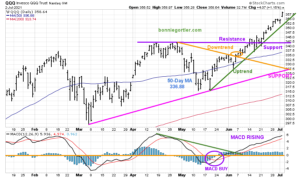 Do you have money invested in the stock market? If so, are you aware how your capital is being invested? Would you be surprised if I told you that many people that I have spoken to have no idea where there money is invested? They do not know how much is invested in equities or in bonds, whether it’s in the overseas markets or invested in the U.S. market. This is because somebody else, other than themselves, is making the decisions for them. Sometimes their company that they work for or an advisor/broker makes the decision for them. Therefore, I would like to share with you a few gems for you think about with keeping this question in mind:
Do you have money invested in the stock market? If so, are you aware how your capital is being invested? Would you be surprised if I told you that many people that I have spoken to have no idea where there money is invested? They do not know how much is invested in equities or in bonds, whether it’s in the overseas markets or invested in the U.S. market. This is because somebody else, other than themselves, is making the decisions for them. Sometimes their company that they work for or an advisor/broker makes the decision for them. Therefore, I would like to share with you a few gems for you think about with keeping this question in mind:
Is the market rising or falling?
Remember when the market is rising investing is easy but when the market is falling there are many more challenges and different decisions are required to be made as your awareness need to be applied.
1. Limit your loss and let your profits run. Most investors including traders sell their positions too soon when making money. Investors can be very stubborn when an investment is losing money and the position should be sold. Taking a loss can be is sometimes very hard to do but controlling risk is necessary to make money. It is very scary when the market is falling 2% a day a few days in a row and before you know it you have lost 10% of your money that you work hard for. Investors either freeze or panic not knowing what to do. I hear statements such as it will come back, it’s only a paper loss, and it’s not a lot of money, I have a small investment, I don’t have to worry about it. Face reality everyone, it’s your money that you will need some point in your life time. Take it from me; it’s much better and good portfolio management to take a small loss. Even if you are wrong and the investment goes higher, you can always buy something else. Take a small loss and do not let it escalate.
2. Risk Management YOU MUST BE COMFORTABLE with your investments in the stock market. Don’t worry about what other say or think. You must be at ease as everybody is different and are in different stages of their life. No matter what age you are, whether you are 20, 50, or 80 years old, you must be able to sleep at night and not worry about your investments. My rule, if you are not sleeping then your portfolio structure is not the correct investment for you. (I have had a few sleepless nights over my career thinking of portfolio structure until I was totally comfortable.) Protecting your assets that you have worked hard for all your life is very important when you construct your portfolio.
3. Who is responsible for your investments? Decide if you are going to be in charge of your investments or if a money manager is required. Remember this does not have to be an all or nothing choice. Many investors take pleasure in following the market and enjoy making the decisions on their portfolios and execute trade for themselves. Trading can be invigorating as you feel strong and in control, especially when you are making money. It’s very different and much more challenging when the market is declining and a totally different feeling when you are losing money. Giving up the control of part of your assets is away to diversify your holdings. You still keep control of some assets while giving an investment advisor capital to supervise and deal with a different portion of your assets. In the end no matter who is in charge, it’s your responsibility to know what is going on,
4. Create an investment plan for your future. What action are you going to begin today to start the investment process to improve your investment outlook? Do you say that you have no money so the future doesn’t matter? Do you say it’s not important now and procrastinate and say I will wait till I am older then I will think about it? Have you thought about where will you be 5 years from now if you keep doing what you are doing? Do you expect a different outcome without making a change? Times change as life occurs in stages, unexpected situations occur and now is the time to be ready, not tomorrow. Do you have 6 – 8 months of living expenses saved in case a disaster occurs? Remember you need to start somewhere. It is never too late to start a retirement fund, save for college, or for your dream place where you desire to travel. Small steps will enable you to move forward and gives you the opportunity to create future wealth that you desire. Proper planning, communication, along with high quality advice will guide you to the suitable investment decisions which will show you the way to a good path of investing to the future road ahead.
5. Flexibility with your investments. Do you know where you money is invested at this moment? Do you have an exit strategy if when times are rough? This is where you have the flexibility to move your money to safety at a moment’s notice. Do you know if you are able to be flexible by changing your investment holdings and having the option to be in cash or a money market where there is no investment risk? Is all your money tied up in company stock and you are not allowed to touch it for weeks, months, or years? Flexibility of your money is crucial in your investment plan as the market characteristics change very fast. Quick decisions are sometime necessary for your benefit so be aware and prepared.
Successful investing in the market is not a game; it will affect your life for years to come. You need to decide what your investment goals are and how much time you have to reach them. Maximize return on your money everyone is looking to do but you need to assess if the market is rising or falling. If the market is rising it is much easier to make money, and you can get away with strategies that will be forgiving, however if the market is falling you should have an exit strategy to protect you. The stock market markets fall twice as fast as it go up, (It feels likes more in real life) remember that capital preservation is the key to successful investing. ARE YOU READY??













I totally agree that people should know where their money is invested, and the risks entailed. It's unfortunate that so many avoid the responsibility for their own financial lives, by using advisers and mutual funds.
So while I agree that people should have a hands-on approach, I disagree with the implication they should micro-manage money in the "cut losers and let profits run" advice, which is commonplace.
Once people set up a portfolio structured and allocated in a way they're comfortable with, they're better off just leaving it alone, at least until they retire.
Too many people who know where their money is invested, pay too much attention to its daily fluctuations in value. I'd advise people to ignore the financial news. Turn off the TV or radio when they start to tell you what the Dow Jones Industrial Average did for the day. Who cares? It will change again tomorrow.
Investment timelines are extremely important. Too many people put short-term money in the stock market. If you plan to spend it within the next ten years, keep it in a certificate of deposit or money market account. Stocks and long term bonds are for the long run — and ten years is NOT the long run. (Though I understand it feels that way when you're 25 years old.)
Starwood Property Trust
Hi, Thank you for your comments. We do have a difference of opinion which is OK and I thank you for sharing your thoughts.
I believe if you have the proper advisor and well run diverse mutual funds, stocks and or bonds, with a strategic plan combined with a exit strategie that it will benefiical and you will have less risk. I have managed money this way for over 25 years and have this type of expertise. Many people do not have this type of skill and will use a buy and hold appoach. If you do this type of approach your drawdown can be quite high and most investors really would not be happy in bear markets.
I agree Investment timelines are extremely important. However each client has a different need and should have a portfolio that is structured for their needs and their level of comfort. .
If you would like to continue this discussion further I would be more than happy to. Please e mail me at bonniegortler@gmail.com with your name and your telephone number.
Thanks again for your thoughts and looking forward to hearing from you soon.
My best.